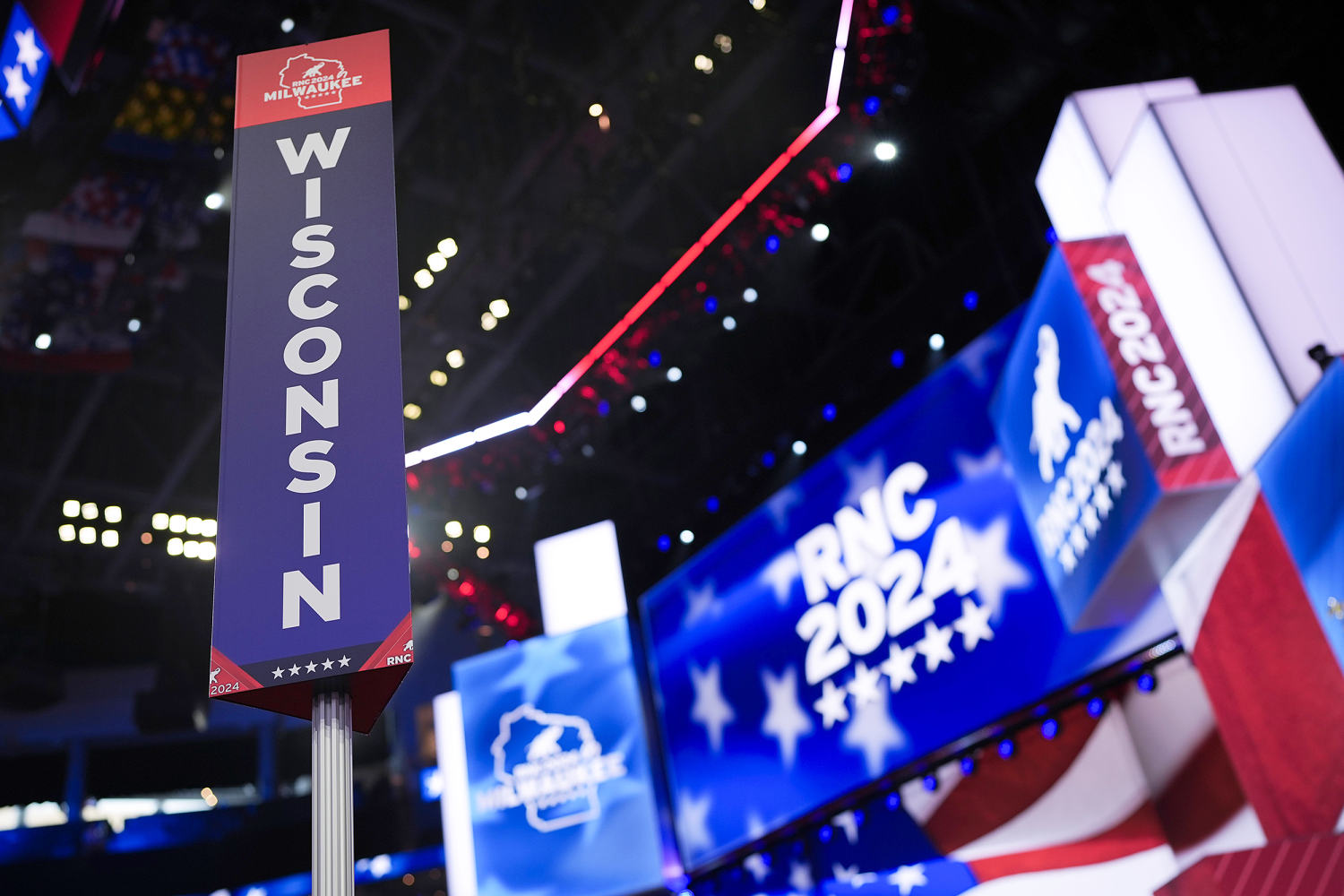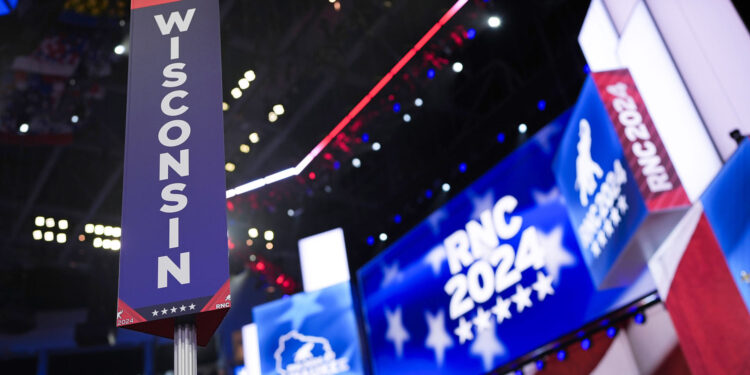
MILWAUKEE — Despite Republicans’ growing confidence about their chances of not just winning the White House but securing both chambers of Congress, too, let’s not forget the reason Republicans chose Milwaukee as their convention city in the first place.
No matter how well former President Donald Trump does in the Sun Belt swing states — Georgia, Arizona, Nevada and North Carolina — he will still need to win one of the three key Northern swing states — Michigan, Pennsylvania or Wisconsin — to get to 270 electoral votes.
And it’s that necessity that made Milwaukee an enticing location for the GOP’s convention. Now, a little reality check: There’s not a lot of data to support the idea that a convention host city on its own can swing a state. Many times, parties pick convention cities for reasons outside Electoral College politics. Chicago hosts a lot simply because of its central location. New York and Philadelphia have hosted a lot of conventions, also because of their centrality to Washington and the political classes in both D.C. and NYC.
The last four times Republicans have won the presidency, their nominee carried the convention host state just twice. Trump carried Ohio in 2016 (Cleveland was the host city), but George W. Bush lost both Pennsylvania and New York after conventions in Philadelphia and New York City. His father, in 1988, won the presidency in an Electoral College landslide that included Louisiana after New Orleans hosted his convention.
The Democrats have had a slightly better track record, carrying their convention host states four of the last five times their party has won the White House (that counts 2020 and the virtual convention originally scheduled to be in Milwaukee). Bill Clinton carried both of his convention host states (New York in 1992 and Illinois in 1996); Barack Obama won Colorado in 2008 but lost North Carolina in 2012. And then Joe Biden carried Wisconsin narrowly in 2020.
The reality is that while simply holding your convention in a swing state doesn’t necessarily guarantee your party will win there, the resources that accumulate in a host city (including money and volunteers) do become huge assets in the fall campaign. Both the Trump and Obama campaigns will tell you the leftover assets from Democrats’ 2008 convention in Denver and Republicans’ 2016 convention in Ohio were quite useful in flipping those states.
So with that little history lesson out of the way, the question remains: Will this convention help Republicans carry Wisconsin?
Here’s the truth: The GOP needs a little help if it’s going to win Wisconsin. Of the three Northern swing states, Wisconsin is the battleground where Republicans have the least confidence and where they appear to be struggling more.
The change in the ideological makeup of the state Supreme Court opened the door for more competitive elections for the state Legislature. For the first time in nearly two decades, state Democrats have a reasonable shot at competing. The potential for a “trickle up” effect, at least when it comes to turnout and campaigning all across the state, is something Democrats are counting on and Republicans are worried about.
That isn’t the only reason Democrats appear to be stronger in Wisconsin than in other battlegrounds. In the Senate race, Democrat Tammy Baldwin has proven to be a formidable incumbent. She has gotten the reputation of being the senator you go to in the state if you need something, no matter which side of the aisle you are on. She has defanged potential critics in a way that’s disarming. Republicans want to be bullish about businessman Eric Hovde, and the competitive nature of the state means their race will be close, but Wisconsin is in the second tier of states GOP Senate watchers in Washington hope to win.
To put it another way, if Republicans defeat Baldwin, it probably means Trump has won an electoral landslide and Republicans have picked up four to six Senate seats.
If there was one main “pro” that advocates of Sen. JD Vance highlighted to put him on Trump’s ticket, it was the idea that perhaps he could help win over some of the traditional, labor-loving, blue-collar Democrats in these three key Northern swing states. When Vance is campaigning solo, we expect to see him a lot in Michigan and a lot in Pennsylvania, as well.
In theory, Wisconsin should also be a frequent stop for him. But keep an eye on his schedule in September and October. I’d be willing to bet that for every stop he makes in Wisconsin, he’ll be in the two other states twice or thrice as often.
Then again, if Trump starts to grow his lead nationally, the distinctions (and closeness) of these three battleground states will start to disappear. And instead, we will be looking at an expanded map for Trump, which could include states like Minnesota, Virginia, New Hampshire and even New Mexico.
Why Schiff’s statement matters
A quick guide how to read the decision by Rep. Adam Schiff to go public about urging Biden to step aside for a new Democratic presidential candidate.
Schiff is a heavy favorite to win the California Senate seat that Dianne Feinstein long held before her death, regardless of whether Biden, Vice President Kamala Harris or some other Democrat is at the top of the California ticket. So this isn’t about Schiff’s worrying over his own future. Schiff’s speaking up is a proxy for a few constituencies that Biden appears to be losing: big donors, House Democrats and Nancy Pelosi.
Schiff lives in Southern California and rose to major prominence during the first Trump impeachment. That means big Democratic donors most likely have his cellphone in their contacts, and to say his phone has been blowing up is an understatement.
Then there’s the issue of House Democrats. The Democrats need a net gain of only four seats to win the majority, and their best opportunities are actually in blue states, specifically California and New York. In fact, seven GOP seats in those two blue states alone are considered highly competitive. But House Democrats’ big fear have about Biden’s leading the ticket is that his failing candidacy and abilities to campaign have created a depression in the party that will drive down turnout by November, especially among Democrats in blue states.
The thinking goes: If you’re an angry or demoralized Democrat about Biden (and there are a lot of them), you may hold your nose and vote for him only if you think your state matters in the presidential election. But if you don’t live in a battleground state — and neither California nor New York are battleground states — and you want to send a message to Biden by not voting, a blue-state Democrat might feel less guilty about no-showing.
That explains why more House Democrats have been vocal about getting Biden out than even Senate Democrats. It’s not that Senate Democrats are more supportive of Biden’s staying in (they’re not). It’s simply that Senate Democrats know that even if Biden (or another Democrat) wins the White House, they are still likely to lose their majority because of the tough map of Senate seats they’re defending this year.
And that brings me to Pelosi. Schiff has been a close ally of Pelosi’s his entire congressional career. Pelosi tapped Schiff for a lot of tough assignments, from the first impeachment to chairing the House Intelligence Committee. Pelosi was also instrumental in helping Schiff become the Senate front-runner in his primary. I doubt Schiff would be doing this if he thought Pelosi was leaning toward supporting Biden’s staying in.
While no one is willing to confirm there’s coordination going on right now, it’s hard not to see some attempt by congressional Democrats to re-apply pressure to Biden to reconsider his presidential bid. Wednesday alone began with the Schiff statement and culminated with the non-denial denial of the story about Senate Majority Leader Chuck Schumer’s one-on-one meeting with Biden on Saturday (just before the attempted assassination of Trump), to which Schumer came supplied with polling data for a “blunt” conversation with Biden about his political standing following the June 27 debate. In between, there was a new AP-NORC poll showing large chunks of Democrats of all stripes wanting Biden to step aside.
Here’s the reality: The walls are closing in on Biden. His Covid diagnosis Wednesday and the subsequent need to isolate due to his age makes it only that much harder for Biden to try to convince Democratic leaders that his debate performance was simply one bad night. The only question now is whether he succumbs to the pressure before Democratic convention delegates themselves take matters into their own hands.
The one ace in the hole Biden’s inner circle thought it had was control of the convention process. But the Democratic National Committee’s decision to postpone the party’s virtual roll call nomination by at least a week, after pressure from Schumer and House Minority Leader Hakeem Jeffries, is starting to make Biden look like a man on an island.







